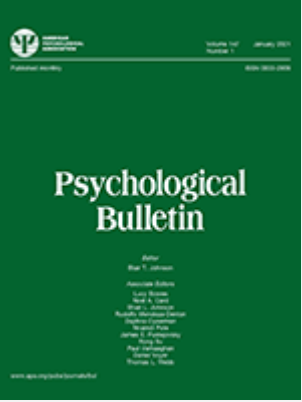认知评价与情绪之间的关联:荟萃分析综述。
IF 19.8
1区 心理学
Q1 PSYCHOLOGY
引用次数: 0
摘要
情绪认知评价理论的核心前提是,情绪产生于我们对所经历事物的解释。与情绪学的其他主要理论框架相比,评价视角强调认知解释在产生情绪过程中的核心地位。经过几十年的研究,许多研究大致认同评价过程的中心地位,但在细节上却存在分歧,评价维度的清单、术语以及对选择性评价与情绪之间关系的定性预测都不尽相同。尽管已经发表了数百项实证研究,但该领域仍然缺乏系统的定量荟萃分析来支持评估与情绪之间的详细关系。在此,我们对 251 份报告中 309 项研究的 2634 个效应大小进行了混合效应荟萃分析,涵盖了 47 种不同的评价和 63 种情绪,以评估 853 种特定评价-情绪关系的证据。我们发现,75.0% 之前假设的评价与情绪之间的关系在统计学上是有意义的,平均效应大小为中度到大型(平均 r = 0.33)。我们还强调了许多以前未曾预料到的关系,其平均效应大小为中小规模(平均 r = 0.27),这可以为今后的确认性研究和理论完善奠定基础。作为总结,我们提供了评估维度的分类法以及这些情绪的评估特征,这对情感科学家、临床心理学家和应用行为研究人员都很有用。总之,这篇综述记录了该领域的知识现状,并为未来的研究提出了新的假设。(PsycInfo Database Record (c) 2024 APA, 版权所有)。本文章由计算机程序翻译,如有差异,请以英文原文为准。
Associations between cognitive appraisals and emotions: A meta-analytic review.
The core premise of cognitive appraisal theories of emotion is that emotions are produced from our interpretation of what we experience. Compared to other major theoretical frameworks in emotion, the appraisal perspective emphasizes the centrality of these cognitive interpretations in giving rise to emotions. Decades of research have yielded numerous studies that broadly agree on the centrality of the appraisal process, but differ in the details, with different lists of appraisal dimensions, terminology, and only qualitative predictions for the relationship between select appraisals and emotions. Despite hundreds of published empirical studies, the field still lacks a systematic, quantitative meta-analysis that can establish support for the detailed relationships between appraisals and emotions. Here, we conducted a mixed-effects meta-analysis of 2,634 effect sizes from 309 studies across 251 reports, covering 47 distinct appraisals and 63 emotions, to assess the evidence for 853 specific appraisal-emotion relationships. We find that 75.0% of previously hypothesized relationships between appraisals and emotions were statistically significant, with an average moderate-to-large effect size (mean r = .33). We also highlight many previously unpredicted relationships, with an average small-to-moderate effect size (mean r = .27), which can form the basis for future confirmatory studies and theory refinement. As a summary, we provide a taxonomy of appraisal dimensions, as well as appraisal profiles of these emotions, which could be useful to affective scientists, clinical psychologists, and applied behavioral researchers. Taken together, this review documents the state of knowledge in the field and generates new hypotheses for future research. (PsycInfo Database Record (c) 2024 APA, all rights reserved).
求助全文
通过发布文献求助,成功后即可免费获取论文全文。
去求助
来源期刊

Psychological bulletin
医学-心理学
CiteScore
33.60
自引率
0.90%
发文量
21
期刊介绍:
Psychological Bulletin publishes syntheses of research in scientific psychology. Research syntheses seek to summarize past research by drawing overall conclusions from many separate investigations that address related or identical hypotheses.
A research synthesis typically presents the authors' assessments:
-of the state of knowledge concerning the relations of interest;
-of critical assessments of the strengths and weaknesses in past research;
-of important issues that research has left unresolved, thereby directing future research so it can yield a maximum amount of new information.
 求助内容:
求助内容: 应助结果提醒方式:
应助结果提醒方式:


